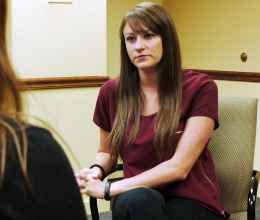
CHICAGO – Health care clinics operated with federal taxpayer funds are limited in their capacity to meet public health demands in Peoria, because they operate under religious restrictions necessitated by lease agreements with a religiously-based health care provider. This finding is the result of a more than year-long investigation by the ACLU of Illinois of publicly funded health care clinics operated by Heartland Health Services (“Heartland”) across Peoria. Specifically, the Peoria clinics limit birth control availability for many residents in the area.
The ACLU of Illinois began investigating Heartland and its relationship with OSF St. Francis Medical Center in late 2015, after hearing repeated complaints from community members. After submitting a Freedom of Information Act request and discussing the results with Heartland personnel, the ACLU concludes requirements that Heartland comply with religious restrictions imposed by OSF creates significant hurdles for many Peoria residents who need access to contraceptive care.
"We are very concerned about the impact Heartland's compliance with religious restrictions is having on women in Peoria, particularly low-income and minority women," said Jenna Prochaska, staff attorney for the Women's and Reproductive Rights Project at the ACLU of Illinois. "The community deserves providers that serve all of their health care needs, regardless of the institutional religious affiliation of the clinic or its community partners.”
Heartland operates four sites in Peoria using taxpayer money. Two of these clinics – located on Garden Street and Armstrong Street – are located on property that Heartland leases from OSF. No birth control prescriptions are offered at these two locations.
Patients who seek contraceptives from either the Garden Street or Armstrong street clinics are referred to Heartland's facility in East Bluff. For a woman turned away from Garden Street, visiting East Bluff may involve a 30-50 minute trip on public transportation. And, the East Bluff clinic only offers contraceptive services once a week – on Thursdays, from 1-3 p.m. The ACLU notes that this creates an enormous burden for many women – reporting about a woman who experienced an unintended pregnancy after being unable to get birth control from one of the Heartland facilities, and then unable to visit the East Bluff clinic during these limited hours.
The need for broad access for women seeking contraceptive care in Peoria is recognized by many. The rate of births to women under 18 years of age in Peoria is higher than the statewide average, and that rate is more than 5 times higher for African American women in Peoria. The Garden Street clinic is located in a predominantly African American neighborhood, and is remotely located from the East Bluff facility. Public Health officials in Peoria have made addressing this teen birth rate a priority, listing Heartland and OSF as partners in this process.
"Heartland can be a partner to the community in reducing teen pregnancy, but that it is not going to be effective if the only option young women have is to travel for nearly an hour to make it to the clinic on a Thursday afternoon – during the two hour window in which contraception is available to them," added the ACLU's Prochaska.
The ACLU of Illinois makes a number of recommendations on steps that Heartland can take to improve this situation. In addition to encouraging Heartland to renegotiate the lease agreements with OSF so that there are no restrictions on birth control, the ACLU recommends that Heartland:
- Provide contraception at all locations not covered by the OSF agreements;
- Expand the hours that birth control is available to assist young women and their schedules;
- Train staff to ensure that patients who call seeking contraception are given comprehensive information about their options for accessing birth control as well as assistance in that process; and,
- Ensure that women facing complicated pregnancies are not referred to health care providers bound by religious restrictions, limiting their options for care.
